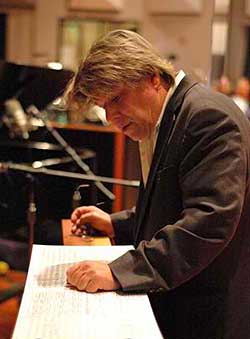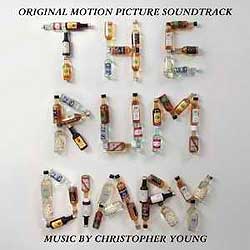 Chris Young ('The Rum Diary')
Chris Young ('The Rum Diary')
'The Rum Deal - Revealed!'
Award-winning composer Christopher Young has added new riffs to his musical lexicon with his jazz-infused score for ‘The Rum Diary,’ based on the eponymous, early novel by Hunter S. Thompson. Depp also produced the film, which features Amber Heard, Aaron Eckhart, Richard Jenkins and Giovanni Ribisi. Bruce Robinson adapted the novel for the screen and also directed the film.
‘The Rum Diary’ incorporates a tone typical of Thompson’s work, with characters plagued by restlessness, violence, alcohol and fear of growing old. Originally penned in 1960, the “lost novel” was published in 1999.
Young explores an exciting variety of mood and rhythm, reminiscent of the first jazz music for films released in the 60s. The music moves effortlessly from blues, fusion, funk and scat to soft Brazilian samba, threaded throughout with saxophone, organ, guitar, trumpet and harmonica.
A former jazz drummer before he began his scoring career, Young possesses that rare instinct for phrasing that sounds improvisational, a rarity for a recorded score.
With the release of the Rum Diary soundtrack, you have this time made one of your works a jazz infused score. Why did you feel jazz was the way to go here? “For two reasons: first and foremost it was because it was the way that Bruce Robinson the director thought the score should go. He said, “Chris, what do you think about having this score primarily jazz influenced?”, and you know, it’s the world that I was raised in. I’d be very comfortable doing that. We have an infinite field of possibilities with jazz. The movie’s like the late 50’s early 60’s, it starts off with Dean Martin’s version of Volare – that became the launchpad for the score. …whole ensemble style and strings, much like the Frank Sinatra style that was popular in the late 50’s.”
“Those arrangements were my main inspiration. It’s a world I was very comfortable in because of my history as a jazz drummer, and I happen to adore the Sinatra sound that I had won an award many years ago that Frank Sinatra had for young arrangers and composers. I did an arrangement of “Strangers in the Night” with one of his arrangers Billy May… Don Costa… I got to know them.”
For this film, you explored an exciting variety of mood and rhythm, reminiscent of the first jazz music for films released in the ‘60s. Did you simply watch old movies from that time, or listen only to albums and such? “I didn’t have to do too much research because it was a world I was already familiar with. Because of my great fortune of having won the Frank Sinatra award and wanting so desperately to get him to cover a song that I wrote, I spent a lot of time… I got to know that sound pretty clearly by being obsessed with it for a year.”
“Being a jazz drummer, I played in a variety of situations. By the time this movie came around, I’d already done 3 movies that dealt with jazz music, like “The Hurricane” with Denzel Washington, Rounders with “Matt Damon” (jazz funk combo), “Shade” with Sylvester Stallone, which was a gambling moving that I put a jazz combo in. One of my first jazz scores was “Norma Jean and Marilyn” with Ashley Judd and Mira Sorvino.”

The score is said to “incorporate a tone typical of Hunter S. Thompson’s work”…but, can you please explain that some more? “The fact of the matter is, never had I read up on Hunter S. Thompson, though I read the script, I was encouraged not to read the book that it was based on.
I have to apologize to all of the Hunter S. Thompson fans out there by saying that when I picked up the pen for writing that score I had no idea about Hunter S. Thompson’s work. I had seen “Fear and Loathing in Las Vegas” and liked it
Bruce wanted me to look at the movie and respond to the movie.”
This idea- from- a- book movie, first penned in 1960, first published in 1999, has been kicking around as a proposed movie in the minds of all Thompson fans for many, many years. So aside, from the actual film representation itself, what one thing did you definitely want to get right about the soundtrack so as not to have all those rabid Thompson fans on your back? “When I was writing the score, I was not consciously thinking of what I needed to do to make the Hunter S. Thompson fans happy. What I was thinking of was how do I make the director and everyone else happy – including Johnny Depp. What might make fans happy is that the score honored the time and setting of the movie. A lot of the score has a Puerto Rican flavor. These are tunes that I gave to Bruce – theme options – demos of themes in song form.”
Knowing the soundtrack moves effortlessly from blues, fusion, funk and scat to soft Brazilian samba, what turned out to be the musical speed bump for you (if indeed there was one) to get one over to finally accomplish the work? “The challenge was making everyone happy.
I was thrilled that Bruce came back to me after working together all those years ago on Jennifer 8. I just wanted to make them happy.
My musical brain is able to work with a variety of vocabulary essentially. You can hand me calypso music today, a tango tomorrow, a string quartet the next day, my brain has the ability to be thrown curve balls and catch them. I have a fascination for wanting to understand how different musical languages are formed.”
Observing that you are a former jazz drummer yourself, did you yourself perform on this soundtrack, perhaps? “I performed on one track, ‘Black Note Blues,’ I sing on it.”
Two years ago you won the BMI’s highest honor, The Richard Kirk Career Achievement Award. Is winning awards a big part of your chosen career, or does something like this one mean so much to you that it takes pride of place on the mantelpiece at home? “There are 2 reasons why they are really meaningful for me; it shows the value of my work, the acknowledgement of my peers.
Oscars are really more about the movie than about the music, so the choice of the right movie is important.”
Lastly, and throwing you a journalistic curve ball, we here at Exclusive Magazine LOVE penguins, do you also? “I love pumpkins, and I guess I like penguins because they both begin with ‘P‘!”
Interviewed by Russell A. Trunk
www.officialchristopheryoung.com
'The Rum Diary' CD Purchase Link
Back To Archives

